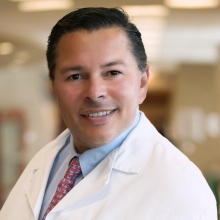
We Care for Your Heart
Our cardiology team focuses on the prevention of heart disease, but offers rapid intervention when a cardiac event occurs and provides optimal treatment after the event to restore a patient’s health. The program includes physicians, nurses and a range of multidisciplinary specialist working with patients to navigate complex health conditions.
By blending both inpatient and outpatient care in one setting, patients have improved access to their physician and the appropriate care they need.
Patient Testimonial
At Portneuf, lives are changed every single day. Stories like these remind us why we seek to provide world-class care to every patient, every time. Hear the story of a life-saving emergency surgery told by one of our Cardiovascular patients.
Device Clinic
The medical group provides comprehensive device management for patients with implanted Pacemakers, Internal Defibrillators (ICD) and Loop recorders. A qualified team of registered nurses, cardiac technologists and pacemaker technicians work in conjunction with cardiologists, electrophysiologists and physician assistants to provide proper device management and optimal function.
In office appointments are performed on a routine basis depending on the device type and patient follow-up needs.
Our physicians combined with highly skilled nursing staff in our device clinic offer high-quality care with a team-oriented approach to patient care.
Devices:
- Implanted Pacemakers
- Internal Defibrillators (ICD)
- Loop recorders
- Zio monitoring
Interventional Cardiology
Interventional Cardiology is a branch of cardiology that deals specifically with the catheter based treatment of structural heart diseases.
A large number of procedures can be performed on the heart by catheterization. This most commonly involves the insertion of a sheath into the femoral artery and cannulating the heart under X-ray visualization (most commonly fluoroscopy). The radial artery may also be used for cannulation; this approach offers several advantages, including the accessibility of the artery in most patients, the easy control of bleeding even in anti-coagulated patients, the enhancement of comfort because patients are capable of sitting up and walking immediately following the procedure.
Procedures:
- Angioplasty
- Coronary angioplasty/Percutaneous coronary intervention
- Valvuloplasty
- Percutaneous valve replacement/TAVR
The main advantages of using interventional cardiology or radiology approach are the avoidance of scars and pain and long post-operative recovery. Additionally, interventional cardiology procedure of primary angioplasty is now the gold standard of care for a heart attack. It involves the extraction of clots from occluded coronary arteries and deployment of stents and balloons through a small hole made in a major artery.









